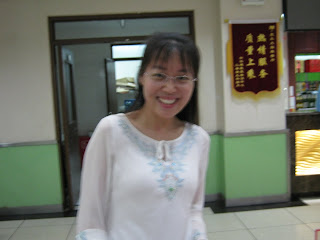Yesterday, we were taken to a local police station to register with the authorities. This is now required of any foreign national residing on a university campus, even if their visit is short. In the past, the university just took copies of our passports. The involvement of the "People's Police" in academic visits is one of many signs that security has tightened in the aftermath of the Olympics.
The experience was routine but unnerving. Yingjuan Tang, who escorted us to the station interpreted for us. She said it was best if I did not let on that I knew some Chinese. The officer who interviewed us, a woman, was very polite but the atmosphere was intimidating. The questions were simple: they wanted to know how long we'd be in China, where we would go, why we were here. She scanned our passports and searched interminably on a bunch of computer screens. She seemed to be doing some type of background check. Afterwards, she printed out forms which she asked us to sign, and stamped them with a big red star representing the People's Republic. I don't think our interviews took more than an hour, but it felt way longer.
I don't think we're in Kansas anymore, or Johnson City for that matter.
Pictures: The ubiquitous People's Police


















